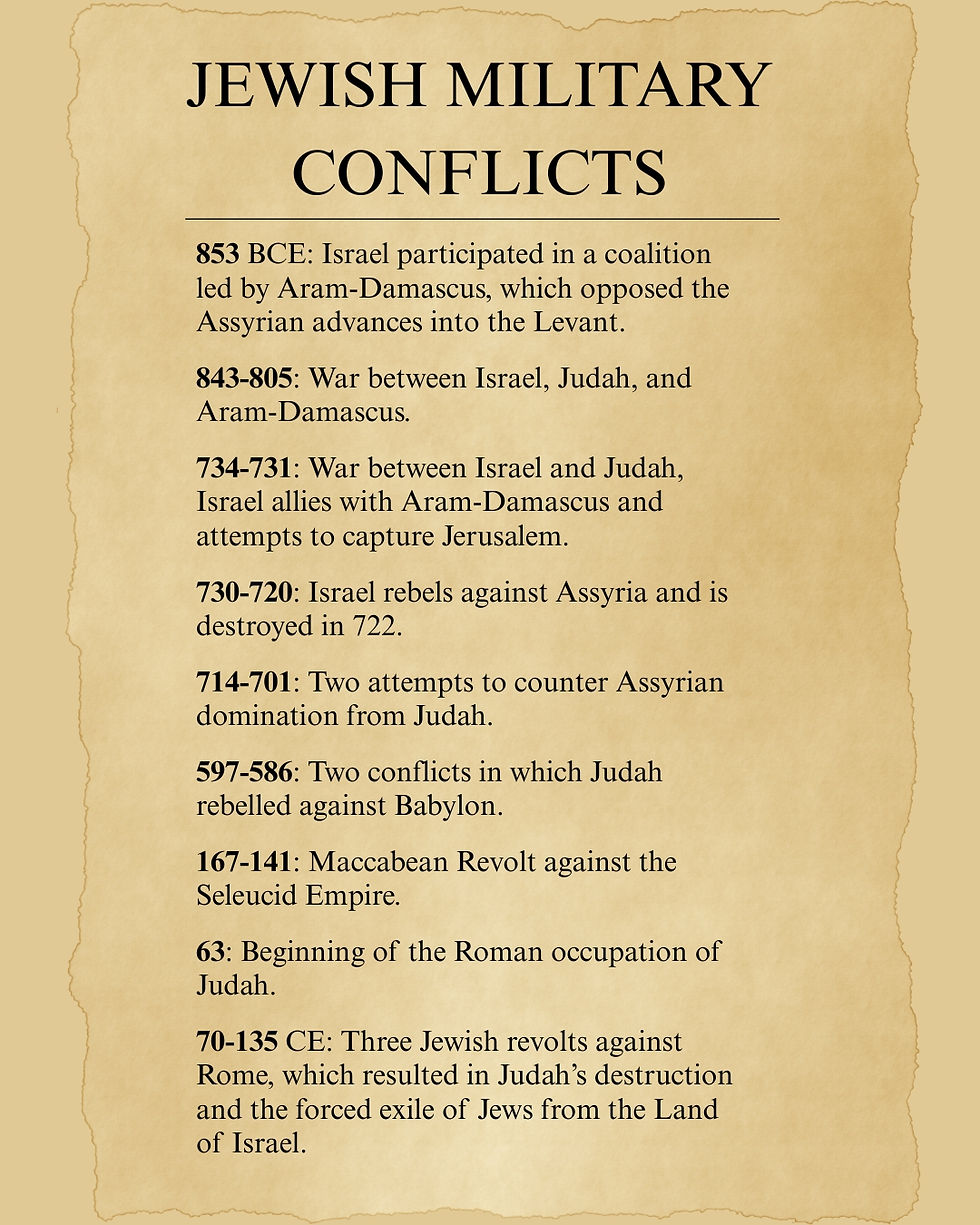On Warrior Ethos in the Jewish Tradition
- Adam Strater
- Jul 14, 2025
- 3 min read
The U.S. Army Warrior Ethos states, "I will always place the mission first, I will never accept defeat, I will never quit, and I will never leave a fallen comrade." The Ethos outlines principles by which American soldiers should abide to be the warriors they need to be while they serve. These statements are specific to U.S. Army doctrine, but the concept of a Warrior Ethos is not unique to the U.S. military.
Jews, for example, have maintained a Warrior Ethos since antiquity.

The Jewish literary tradition and the archaeological record of the ancient Near East confirm that Jews, specifically ancient Israelites and Judahites, participated in warfare and maintained a martial culture from our inception.
The Tanakh, the Hebrew Bible, is replete with examples of the Israelites amassing, organizing, and deploying armies to varying ends. From desert warfare and the Israelite war camp in the Book of Numbers, to the conquest of the Land of Israel in Joshua and Judges, and into the military campaigns of the United and Divided Monarchies in Samuel and Kings, our base texts offer a robust catalog of Jewish heroes and victories, and also casualties and defeats. And throughout, Israelites maintained a Warrior Ethos.
The archaeological record confirms much of what is written about Israel’s and Judah’s familiarity with warfare, with the following distinct periods of military conflict.

Archaeology from the ancient Near East depicts massive losses, but also significant gains for our people, and a sustained Warrior Ethos in which Jews will not accept defeat and never quit remains a common thread.
Outside of the Tanakh, there is a little-known Jewish text that highlights the Warrior Ethos inherent to ancient Judaism, perhaps more than any other. “The War Scroll,” also known as “The War of the Sons of Light Against the Sons of Darkness,” or simply 1QM, was discovered in 1947 in the Judean Desert among the texts that came to be known as the Dead Sea Scrolls. Among the scrolls were biblical and previously known extra-biblical Jewish texts, as well as texts that were original to the “Qumranite” sect that preserved the Dead Sea Scrolls.
The War Scroll was written and edited to its final form sometime in the first century BCE. The author/editor used pre-existing war materials to depict angels assisting the Qumranites, the “Sons of Light,” in battle against the foreign nations who oppress them, the “Sons of Darkness.”
“On the day when the Kittim (the enemy) fall there will be a battle and horrible carnage before the God of Israel, for it is a day appointed by Him from ancient times as a battle of annihilation for the Sons of Darkness (the enemy). On that day the congregation of the gods and the congregation of men shall engage one another, resulting in great carnage.”
According to the text, the war will be waged for generations, but the outnumbered Qumranite army will be victorious because of divine military intervention. The details led biblical archaeologist (and former Chief of Staff for the Israel Defense Forces) Yigal Yadin to conclude that the text was grounded in the knowledge of the contemporary Roman military. According to Yadin, the author intended the War Scroll to be a Jewish art of war that explained the battle plan in detail, like an ancient operations order. The twelve tribes are divided into three battalions: front formations, light infantry, and cavalry. Battalions are then subdivided into companies, which are then further divided into platoons. Armor and weaponry included helmets, shields, spears, swords, and javelins, each made by a skilled craftsman with precise specifications.

There are several reasons why the War Scroll is interesting, and a point that is of particular interest concerning the ingrained nature of the Jewish Warrior Ethos is that it was written and edited at a time when there was no standing Jewish army. Rome had come to occupy the Land of Israel and had quashed any martial impulse on the part of the Jews. And yet, the Jewish author saw fit to spend an incredible amount of time and effort to depict the unceasing Jewish Warrior Ethos, because such an ethos is ingrained within the Jewish experience.

Comments